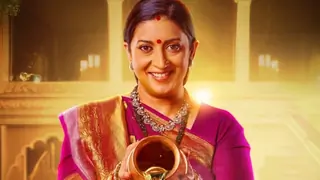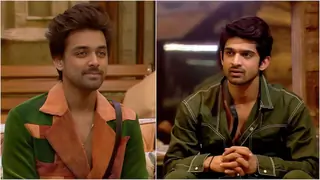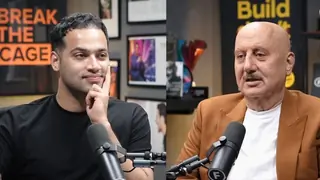Kasuri and Ghulam Ali in India — A concert in Delhi and a solo in Chennai Rasheeda Bhagat
Ghulam Ali, ghazal singer from Lahore... Building bridges between people. — Bijoy Ghosh WITHIN a week of the Foreign Ministers of India and Pakistan, Mr Natwar Singh and Mr Khurshid Mahmud Kasuri, meeting in New Delhi for another round of Indo-Pak dialogue — which ended up in little more than friendly noise from both sides — the city of Chennai, steeped in a rich music tradition, hosted a spectacular
ghazal evening by the Pakistani maestro Ghulam Ali. The event did not catch the national headlines or prime-time television news, nor was it touted as a bridge-building measure between the two countries. And yet, for both for the music
rasikas of Chennai and Ghulam Ali himself, the Ghazal Evening, organised by the Rotary Club of Chennai Samudra, te Rotary Club of Madras and the Ability Foundation, and sponsored by Airtel, would have thrown up positive surprises. The applause and adulation he got are not new to the Pakistani singer, who visits India regularly, though he was in Chennai after 19 years. Taking the Indo-Pak talks first, there was bluster on both sides. Mr Kasuri said at the outset that, contrary to media reports, Pakistan was not "unifocal" on Kashmir, and that he had come prepared to discuss everything, including Kashmir. And at the press conference, when journalists from both countries came out with complaints on the rigid visa regime on both sides, Mr Natwar Singh promised with a flourish to talk to the Home Minister, Mr Shivraj Patil, to ensure that visas are given freely to Pakistani journalists. When Imtiaz Alam, promoter of the media group SAFMA (South Asia Free Media Association) lambasted both the sides for keeping a tight control on the movement of journalists, Mr Natwar Singh said with a smile: "There should be no problem in allowing Pakistani journalists to move freely" and asked Mr Alam, "
Aap kahan jana chhateh ho? (where do you wish to travel?). Mr Kasuri, of course, was more cautious and said that with the recent Cabinet reshuffle in Pakistan, he could not make any concrete promises, like his Indian counterpart, but was sympathetic to giving journalists access. "In fact, in Pakistan, I'm known as an anti-establishment man," he said. That all this was mere rhetoric will soon be evident when journalists knock on the High Commission doors in either country. Regulars know only too well how difficult it is for the media fraternity to get visas; even when you get one, on occasions like the Indo-Pak talks, the visa is for a very short period and confined to the city where the talks are to be held. A bonus, of course, is the tail you always have, but this should not bother a journalist whose intent is anyway just news coverage. In Islamabad, this correspondent found it very convenient to have an "escort" — as my taxi driver referred to the man on the motorbike who followed us religiously — because he could be used to find addresses! In an interview to
The Hindu in New Delhi, Mr Kasuri had sounded keen on the oil-gas pipeline project and suggested a joint working groups comprising India, Iran and Pakistan. That was on September 8. Within a week, the newly appointed Pakistan Prime Minister, Mr Shaukat Aziz, thundered, on the eve of the meeting at the UN between the Prime Minister, Dr Manmohan Singh, and the Paksitan President, Gen Pervez Musharraf, that the gas pipeline is linked to Kashmir. In an interview to the
Pakistan Observer, he said: "We are ready to allow transit facilities and foolproof security to the Iran-India gas pipeline but India will have to deal with the Kashmir issue in an equitable and peaceful manner." This hardly comes as a surprise because only the nave and the uninitiated in the web of Indo-Pak relations could have imagined that the road from New Delhi to Islamabad does not run through Kashmir. That is why, and in the background of this blow-hot, blow-cold relationship, the
ghazal evening with Ghulam Ali, and an interaction with him , came as such a pleasant experience. In a chat with
Business Line, Ghulam Ali said that he is overwhelmed by the "respect and love I
always get from the audiences in India." Even when he performs overseas, in the US or the UK, Indians form a chunk of the audience. In April 2004, he had performed to a packed hall in Sunnyvale, California. The event had been organised by the Hindu Temple and Community Centre and the Indo-American Society of Bay Area. The event, which raised over $20,000, was for the renovation of the temple and, before the concert, Ghulam Ali visited the temple and was honoured by the temple management. The singer does not make much ado about his involvement in a temple fund-raiser, saying, "After all, our maker is the same." He adds that, whether it is Pakistan, India or a Western venue, he is "extremely lucky to be heard in rapt attention by the audience." India is, of course, a favourite venue, and when one asked him before his concert in Chennai whether he was not apprehensive about the audience's limited ability to understand the chaste Urdu in which most
ghazals are composed, he said with a smile, "People in Chennai might not know Urdu, but no other city in the world can appreciate music like this city... So, on that count, I have no fear." Considering that some Malayali
rasikas came all the way from Kollam in Kerala to Chennai, and that too without knowing a word of Hindi or Urdu, to listen to him last Saturday, speaks a lot for the interest Pakistani
ghazal singers like Ghulam Ali generate in India. Among Indian musicians, Ghulam Ali, who has been singing
ghazals for 44 years, admires Pandit Jasraj and Ravi Shankar the most. A soft-spoken and pleasant man, he says with a frown, when asked to comment on pop music: "Perhaps today's generation might call it music and enjoy it; but I can't enjoy music
jaha par idhar udhar stage par chalang lagatey hei." At the concert, his faith in the Chennaiite's knowledge of music was fully justified. The hall was packed and, luckily, though the donor tickets were priced between Rs 1,000 and Rs 2,000, tickets at the lower end were available at Rs 250. As one watched him render the evergreen thumri "
Gori tere nain kajal bina kale", or Mirza Ghalib's delightful "
Har ek baat pe kehte ho tum ke tu kya hai/ Tumhi kaho yeh andaz-e-guftgu kya hai", or his all-time favourite "
Chupke chupke raat din ansoo bahana yaad hei" or the unbeatable "
Hangama hai kyo barpa thodisi so pi li hei", one could hardly believe the transformation of the simple, unassuming person one had met over dinner just the previous evening. Incidentally, at that dinner, he had asked for "soda with ice", prompting the question of stronger spirits being normally required to put
ghazal singers in mood. "It is Allah who gives me the mood to sing; I've never touched alcohol in my life. My father had told me to strictly keep off this stuff," he said. Privy to this secret, one heard with a smile his delightful rendering of the famous
Hangama number, which is dedicated to the tipplers of this world.
Anyway, the thunderous applause he got from the Chennai audience which, most of the time, did not even require his helpful translation of intricate Urdu words, will remain with Ghulam Ali for long, as will the magic of that evening.
Edited by Qwest - 19 years ago

























